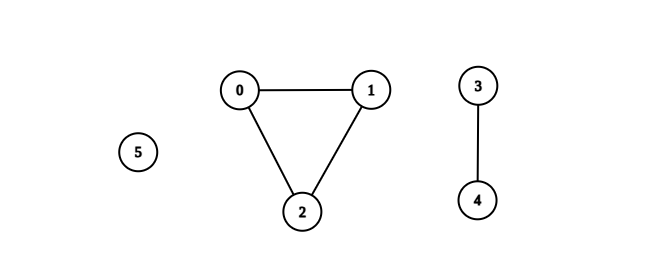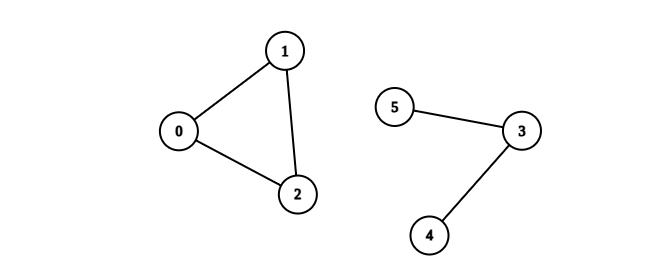Description
You are given an integer n. There is an undirected graph with n vertices, numbered from 0 to n - 1. You are given a 2D integer array edges where edges[i] = [ai, bi] denotes that there exists an undirected edge connecting vertices ai and bi.
Return the number of complete connected components of the graph.
A connected component is a subgraph of a graph in which there exists a path between any two vertices, and no vertex of the subgraph shares an edge with a vertex outside of the subgraph.
A connected component is said to be complete if there exists an edge between every pair of its vertices.
Example 1:

Input: n = 6, edges = [[0,1],[0,2],[1,2],[3,4]] Output: 3 Explanation: From the picture above, one can see that all of the components of this graph are complete.
Example 2:

Input: n = 6, edges = [[0,1],[0,2],[1,2],[3,4],[3,5]] Output: 1 Explanation: The component containing vertices 0, 1, and 2 is complete since there is an edge between every pair of two vertices. On the other hand, the component containing vertices 3, 4, and 5 is not complete since there is no edge between vertices 4 and 5. Thus, the number of complete components in this graph is 1.
Constraints:
1 <= n <= 500 <= edges.length <= n * (n - 1) / 2edges[i].length == 20 <= ai, bi <= n - 1ai != bi- There are no repeated edges.
Solution
Python3
class DSU:
def __init__(self, n):
self.parent = [i for i in range(n)]
self.rank = [0 for i in range(n)]
def find(self, x):
if self.parent[x] == x:
return self.parent[x]
self.parent[x] = self.find(self.parent[x])
return self.parent[x]
def union(self, u, v):
pu = self.find(u)
pv = self.find(v)
if self.rank[pu] < self.rank[v]:
pu, pv = pv, pu
self.parent[pv] = pu
self.rank[pu] += self.rank[pv]
class Solution:
def countCompleteComponents(self, n: int, edges: List[List[int]]) -> int:
uf = DSU(n)
for a, b in edges:
uf.union(a, b)
res = 0
parents = defaultdict(list)
E = defaultdict(int)
for node in range(n):
parents[uf.find(node)].append(node)
for a, b in edges:
p = uf.find(a)
E[p] += 1
for parent in parents.keys():
k = len(parents[parent])
e = E[parent]
if k * (k - 1) // 2 == e:
res += 1
return res